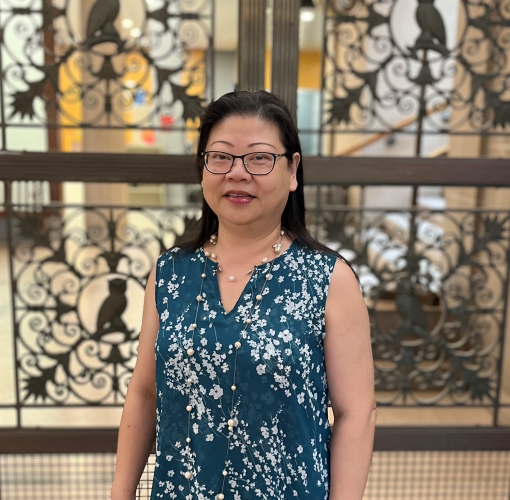
“But where do they come from?” is a question about fruit flies that people have screamed, presumably since the dawn of time. In the not-too-distant past, answers to questions like these would have been difficult or impossible to find. Now, you ask Alexa, Siri, or a social media circle, where someone is likely to offer snarky assistance.
At the University of Rochester, when students, faculty, or staff have a question about an area of study or research, they could ask one of the aforementioned virtual assistants. But they would be better off asking a River Campus Libraries subject librarian. (For a quick explanation of what a subject librarian is, check out “Checking In with Moriana Garcia.”)
For the better part of 16 years, Kathy Wu has been the University community’s go-to source for support for work related to government information, economics, law, and music. In addition to managing the collections, maintaining web content, and serving as general support for her subject areas, Wu is the liaison for the Federal Depository Library Program (FDLP), which ensures the American public has access to government information. In this role, she maintains all records for the FDLP materials and collection and creates policies, procedures, and strategies around compliance with FDLP guidelines.
But two months ago, Wu’s portfolio changed in a small yet significant way.
On May 1, Wu officially became the business/economics librarian. However, her portfolio is basically the same. The only difference is she is no longer the contact for music resources (that’s now Pauline Schwartzman), which is purely an issue of bandwidth.
We talked to Wu to get a better sense of what this change entails.
First, how did you become the business/economic librarian?
Wu: I had to apply for the position. In the past, business and economics librarians were separate, and the library decided to consolidate the positions. So, it wasn’t just a matter of moving the area into my portfolio.
That means you could have lost economics, right?
Wu: Yes. When I was told about the consolidation, it was suggested that I apply for the position, which I was happy to do because I have been working with the faculty and students from the economics department for 16 years, and I didn’t want to lose that. I really enjoy working with them.
I’m also the manager of the two RCL data programs—one is the data set grant program, and the other is the social sciences and humanities data purchase program. If I were no longer the economics librarian, I would have to give up those programs because I would need to be knowledgeable about the students’ research to be a good advocate. And the data set program was my idea; I created it, so it is like my baby.
Losing economics would be like losing my professional identity. I would have to start all over.
Thankfully, you don’t have to do that because you got the job—which is mostly the same. What will be different?
The big difference is the number of people I’ll be supporting. I’ll be adding 113 faculty members and more than 1300 students from the Simon [Business] School to the 29 faculty members and 64 graduate students I already support in the economics department.
After 16 years, I know the economics faculty by name. I could individualize the emails, if I ever needed to promote something for the library or communicate something to the department. But now I have almost five times as many people to contact. So, it’s more challenging to use that personal touch.
We’re confident you’ll find a way to develop a personal connection with the business community. So, what else can they expect from Kathy Wu?
Another reason I applied for the job is I have been the backup librarian since 2015. Even though I wasn’t working with students and faculty regularly, I know the resources they use and need quite well. I worked with the previous business librarian to select databases, so I’m familiar with most that are being used. One of my goals for the first year is to familiarize students with databases and other resources and build their skills in using them. Having good search skills can really help produce better data for research.
Before getting this job, the number of students kind of intimidated me, but that went away when I thought about how much I can do for them. And that made me excited. I feel very confident. I know I can really help students and faculty do their research. ∎
For more on scholarly communication or Kathy Wu’s work, ask her. Contact her at kathyw@library.rochester.edu.
Enjoy reading about the University of Rochester Libraries? Subscribe to Tower Talk.

